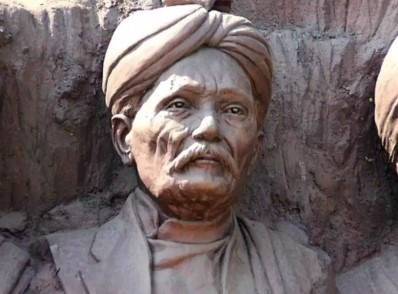For countless tea enthusiasts in Bharat, starting the day with a cup of chai is a cherished ritual. Tea not only offers a comforting start to the day but also serves as a social connector in bustling tea stalls across the country.
Yet, behind this simple pleasure lies a significant historical figure: Maniram Dewan, Bharat’s pioneering tea planter and a dedicated freedom fighter during the 1857 uprising.
The Trailblazing Tea Planter
Maniram Dewan, born Maniram Datta Barua in 1806 in Assam’s Jorhat district, played a pivotal role in introducing tea to Bharat. His journey began when he presented the tea varieties cultivated by the Singhpo tribe to British officer Robert Bruce in the 1820s. At that time, the British were reliant on Chinese tea and sought alternatives.
Maniram’s introduction of tea led him to become Bharat’s first tea planter. However, his initial support for the British shifted dramatically when he discovered their exploitative practices towards Assam’s tea growers. By the 1840s, Maniram resigned from his Dewan position and established tea estates in Senglung and Cinnamara.
Tragically, Maniram’s defiance against British exploitation led to his execution on February 26, 1858, in Jorhat, accused of treason.
A Revolutionary Tea Advocate
Maniram Dewan’s story is not just about tea; it is also a tale of resistance. His family, originally from Kannauj, migrated to Assam in the 16th century and held significant positions in the Ahom kingdom. During the Burmese invasion, they sought refuge in Bengal, only to later align with the British when the Ahom kingdom fell to Burmese rule.
At the age of 22, Maniram was appointed Tehsildar of Rangpur under David Scott. His intelligence and business acumen made him a key figure in the East India Company (EIC). Realising the British discontent with smuggling tea from China amidst the Opium Wars, Maniram sought to disrupt their monopoly.
During a field visit, he encountered the Singhpo tribe, known for their traditional tea-making methods. Tribe chief Bessam Gam demonstrated the tea brewing process to Robert Bruce in 1823, using sun-dried leaves that were heated in a metal pan. Robert Bruce sent samples to Kolkata for analysis, leading to the establishment of a Tea Committee in 1834.
Maniram’s efforts culminated in his appointment as Dewan of the tea estate in Nazira, Subsagar, in 1834. By 1830, Assam had become Bharat’s leading tea producer, accounting for over half of the country’s tea output by 2019.
However, Maniram’s discontent with the EIC’s exploitative practices, including unfair taxes and land seizures, led to his resignation. In the early 1840s, he established a tea garden at Chenimore in Jorhat but faced resistance from the EIC, who viewed him as a threat.
The 1857 Uprising and Its Aftermath
Maniram Dewan’s growing influence among Assamese tea growers and his nationalist fervour led him to support the 1857 uprising. He rallied Ahom rulers and Assam Light Infantry sepoys in a rebellion against the British. Despite promising financial rewards to sepoys, Kanderpeswar, the Ahom leader, was captured and imprisoned.
Maniram’s involvement in the uprising was soon discovered by the British, leading to his capture and execution. His courage and sacrifices for India’s freedom remain a significant part of Bharat’s history.
Legacy and Recognition
Maniram Dewan’s contributions to both the tea industry and Bharat’s freedom struggle are commemorated through various tributes. The Maniram Dewan Trade Center hosts international tea festivals, and a 1963 national award-winning film celebrates his life and legacy.
Maniram Dewan’s remarkable journey as a tea pioneer and freedom fighter continues to inspire and remind us of the rich history behind every cup of tea.

















